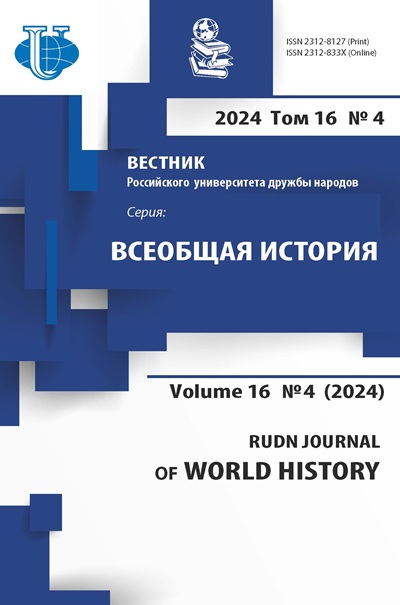No 2 (2013)
- Year: 2013
- Articles: 11
- URL: https://journals.rudn.ru/world-history/issue/view/132
Articles
Editor’s note
RUDN Journal of World History. 2013;(2):5-7
 5-7
5-7


‘Confucian capitalism’ or ‘Confucian socialism’? Roots of the Chinese modern political model formation
Abstract
The article is devoted to finding the reasons influencing on appearing of such phenomenons as ‘Confucian socialism’ and ‘Confucian capitalism’. The author reflects on the political and philosophical traditional concepts influencing on the modern China in historical perspective. She tries to answer the question: what are the roots of the unique Chinese modern political model formation?
RUDN Journal of World History. 2013;(2):8-18
 8-18
8-18


Changes in the socio-economic life of the Shanghai society under the influence of the foreign community in 1920–30's
Abstract
In article discussed the process of a transformation of Shanghai community This paper shows that for the proper understanding of the process of a transformation in Shanghai community it is highly important to emphasize the synthesis of Eastern and Western culture and to reveal the impact of foreign investments on the social and economic life of citizens in this period. From this perspective, we suggest that there was a significant effect resulted in social changes both within the Chinese citizens and Shanghailanders.
RUDN Journal of World History. 2013;(2):19-31
 19-31
19-31


The problem of Ceuta and Melilla in the context of the modern relations between Spain and Marocco
Abstract
The article is devoted to the modern relations between Spain and Morocco from the point of view of the Spanish side in context of the territorial dispute on the cities of Ceuta and Melilla that are situated on the north of Africa. Spanish side considers the cities as an integral part of its territory which holds a certain level of strategic, politic, military and economic value.
RUDN Journal of World History. 2013;(2):32-40
 32-40
32-40


Ukraine’s policy in Afghanistan
Abstract
The article investigates the process of evolution of Ukraine’s foreign policy in Afghanistan. The author determines the national interests of Ukraine in this state and describes the main stages of cooperation in political, military and economic spheres. The current issue is considered on the basis of the analysis of a number of Ukraine’s doctrines in the field of foreign policy and national security. The author concludes that the relations between Ukraine and Afghanistan don’t contain any contradictions, which could have a negative impact on their development.
RUDN Journal of World History. 2013;(2):41-48
 41-48
41-48


U.S. aid to Taiwan in education in the post-war period (1951–1965)
Abstract
The article considers the main stages and goals of U.S. aid to Taiwan in the field of education. Highlighted the leading role of the U.S. in the Taiwanese education system reform and training specialists abroad. Special attention is paid to the influence of changes in education on the process of post-war reconstruction of society in Taiwan.
RUDN Journal of World History. 2013;(2):49-55
 49-55
49-55


The relations between Russian Federation and republic of Turkey in the contetext of Eurasian geopolitical conception
Abstract
The article deals with the comperative-chronological analysis of the role of Eurasian gepolitical conception which have very deep historical roots of the relations between Russia and Turkey in the aftermath of the Cold War. In this research author analysed elements of competititon, dynamics of approaching and their occurence through the caracteristics in the relations between two countries.
RUDN Journal of World History. 2013;(2):56-73
 56-73
56-73


 74-94
74-94


«The Olympic Games: History and the Present». Academic conference «The Occident and the Orient: Priorities of the Age» (Moscow, 13 April, 2012)
RUDN Journal of World History. 2013;(2):95-101
 95-101
95-101


The discussion about the development of the Byzantine city (M. Syuzyumov – A. Kazhdan)
Abstract
The article is about the fait of the Byzantine cities during the «dark ages». Two major Russian Byzantine scientists spent years discussing on the continuity of the Byzantine city. M. Syuzyumov was a supporter of the theory of continuity, and his opponent supported the discontinuity theory.
RUDN Journal of World History. 2013;(2):102-107
 102-107
102-107


Our authors
RUDN Journal of World History. 2013;(2):108
 108
108
















